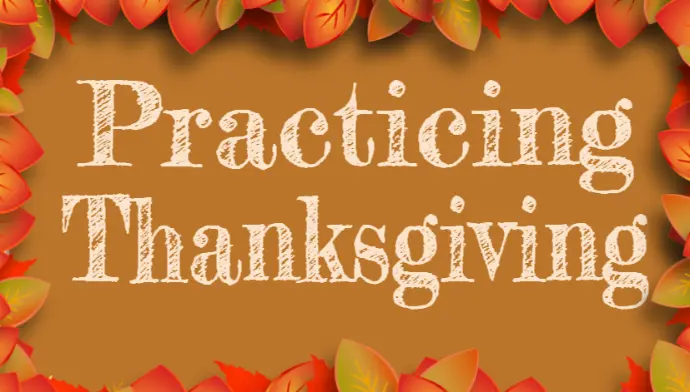Intro
There are many benefits of practicing gratitude as we looked at in last week’s blog. One of the ways to view the practice of thanksgiving is to see giving thanks as an act of humility.
Examples
Everytime we say “Thank you” to a family member, a good friend, a stranger holding the door at the store, the kid at Chick-Fil-A, or God, we are saying that someone else provided something for me that I needed and perhaps could not have had without that “other.”
My Thoughts
In spite of our desire to be our own person, interdependence is part of being human and healthy interdependence through relationships with others is good for us mentally and emotionally. We can all stand to be more grateful and as we are, we gain greater confidence that others will be there for us just as we will be there for them.
Conclusion
Here are some simple practices that you can consider adopting during this Thanksgiving season. Pick one or a couple and commit to making it a habit by practicing them through the end of 2023. You won’t be sorry that you made the effort!
- Begin each day by writing down three things that you are grateful for as you start the day.
- And/Or end each day by writing down three things that you are grateful for from that day. Writing gratitude has been shown to be more effective than simply thinking about or saying what you are thankful for, in part because writing engages more of the whole brain in the practice.
- Write at least one thank you note per week. This can be to someone close or far away. No one will receive a thank you note from you with anything other than joy.
- Pick one person per week to directly thank for something in your life. Start with family members and friends.
- Post-it notes on the mirror or wall that accumulate can highlight various areas of gratitude and are good visual reminders and that can be added to or switched out regularly.
- Practice the simple social skill of Saying “Please,” “Thank-you” and “You’re welcome.” Especially if someone thanks you, practice only saying “You’re welcome.” Nothing else and no justification, explanation or diminishing of the other person’s gratitude. (e.g., “You’re good.” or “It’s no big deal,” or as the guy at the bank said, “Yup” and the like cheat the other person of the benefits of gratitude by undercutting their expressions and making it more about you than about them. Saying “You’re welcome” is also an act of humility.)
- If you want to get more engaged, below is a Gratitude Grid. This one has generic examples. Draw one out for yourself and fill in the boxes daily or over time by adding things to it. It looks at big picture and more personal things over the short term and the long term. You really do have a lot to be thankful for! Happy Thanksgiving!
